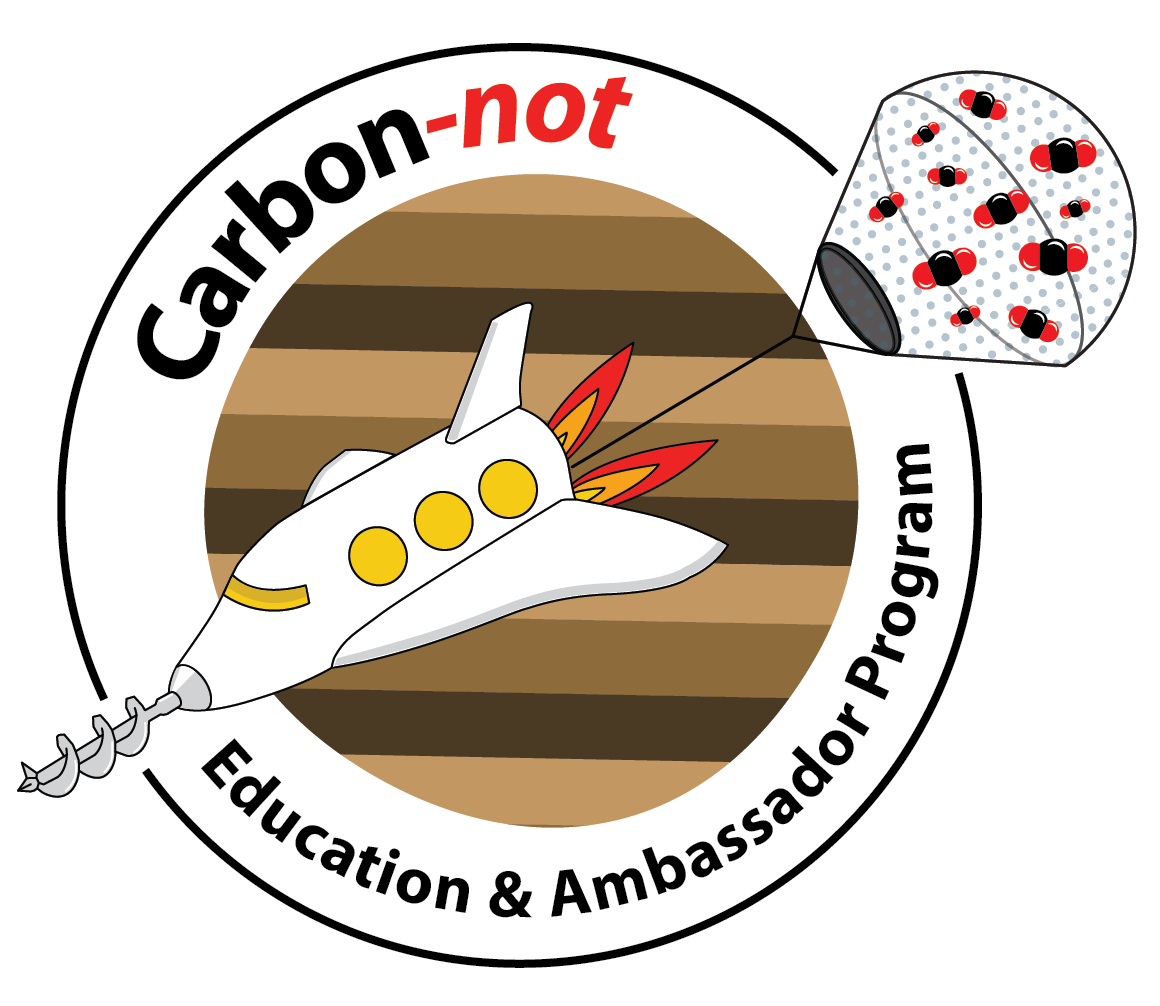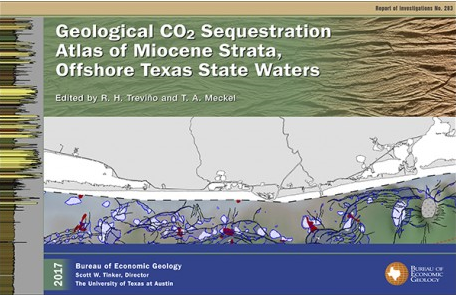Carbon-not Education & Ambassador Program
The Gulf Coast Carbon Center’s Carbon-not Education & Ambassador Program empowers teachers to build expertise in carbon capture and storage (CCS) technologies and helps them create and distribute educational resources for K-12 educators throughout Texas and Louisiana.

Would you like to become a Carbon-not Ambassador? Sign up here.
Read about the first Carbon-not Education & Ambassador Workshop here.
Click here for a detailed summary of upcoming & past activities.
We look forward to meeting more teachers in Texas and Louisiana, since we are currently seeking additional teachers willing to implement newly released curricula about current events and new technology into their classroom. To help future generations, we look forward to providing teachers with the appropriate training, materials, and support for their classroom success.
Program Successes
On November 13–15, 2025, Sue Hovorka, Angela Luciano, and Linda McCall attended the Science Teachers Association of Texas Conference for the Advancement of Science Teaching (CAST25) in Dallas, TX. The group was able to share the variety of short stories, factsheets, comic books, and other outreach materials created over the past year as well as the newly designed groundwater monitoring lab. This lab was designed by Dr. Katherine Romanak to help students understand the role of CCS in climate mitigation, explore acid-base chemistry and mineral dissolution, analyze real world environmental monitoring techniques, and interpret data to draw conclusions on aquifer behavior.
Access lesson plans, step-by-step guidance video, full materials list, and other resources below.
Two high-school teachers from our Carbon-not Ambassador Program, Christy Ross and Kristyn Stovall, teamed up with GCCC Researchers to lead a 1.5-hr-long workshop for ~20 teachers demonstrating this lab. As part of this new assignment designed for STEM teacher’s support, students learn about the reactivity of carbonate and silicate rocks when CO₂ is introduced and can recognize the signs of the gas’ presence in a closed system. Check out all of our materials that are accessible in an online format at put-it-back.org.
On June 30−July 3, 2025, the GCCC’s Carbon-not Education and Ambassador program hosted two high school teachers, Christy Ross and Kristyn Stovall for a hands on 4-day workshop. The goal of this TXLA CMC workshop was to educate, provide training, and up-to-date resources about carbon capture and storage (CCS) for science teachers. CCS is a new STEM technology that is growing in Texas and is an excellent science topic to help advance STEM education. During this summer’s workshop, GCCC Researchers collaborated with experienced teachers to learn how CCS topics may be integrated into high school curricula and Texas Essential Knowledge and Skills (TEKS).
Christy, an Environmental Science teacher at La Vernia Independent School District (ISD), and Kristyn, a Chemistry teacher at Tatum ISD, focused on adapting a groundwater monitoring lab to fit their classes’ educational standards. These two teachers previously attended the GCCC’s CAST workshop in November 2024 held in San Antonio, and built on the previous work completed by our middle school teachers from the summer of 2024. The groundwater monitoring lab that they refined will include elements that will be integrated throughout the year to include conversations on environmental change, the energy transition, human activity, and more. Thank you, Christy and Kristyn, for allowing us to have such a successful workshop!
On June 26, 2025, as part of TXLA CMC’s Carbon-not Education & Ambassador Program, the Gulf Coast Carbon Center helped support a one-hour webinar focused on bringing carbon capture and storage (CCS) into middle school science classrooms. Special thanks to Julia Dolive from Dulles Middle School with Fort Bend Independent School District (ISD) who taught the course in collaboration with Angela Luciano and Sue Hovorka from the GCCC.
Access webinar recording and associated materials below.
The webinar covered how to present concepts from Texas Essential Knowledge and Skills (TEKS) including the greenhouse gas effect and carbon cycle, which included real-world CCS applications. Participants were provided with classroom ready materials aligned with Texas Educational Standards (aka TEKS) to help prepare and provide resources to teachers with recent TEKS updates. This webinar included teachers who work with 6th, 8th, or 6 through 8th grade levels from Benavides, Corpus Christi, Fort Bend, and Orange Grove ISDs.
On November 14–16, 2024, Sue Hovorka, Angela Luciano, and Linda McCall attended the Science Teachers Association of Texas Conference for the Advancement of Science Teaching (CAST24) in San Antonio, TX. The group handed out over 300 recently released CCS comic books by the Gulf Coast Carbon Center (GCCC) that were requested by our Carbon-not Ambassadors and were specifically designed using Texas educational standards for 8th graders.
Access lesson plans and resources for the 7th and 8th grade below.
For the Carbon-not Ambassador Program, organized by the Texas-Louisiana Carbon Management Community, Dr. Cynthia L Hopkins from Corpus Christi Independent School District (ISD) and Stephanie Hurst from Cleveland ISD attended CAST24 to help spread the word about our Carbon-not Resources. These Master Teachers worked with GCCC Researchers to create and implemented CCS curricula and resources suited for 7th and 8th graders based on Texas learning standards (known as TEKS). For more information, click on: www.put-it-back.org
- For the duration of the conference, the Bureau of Economic Geology, with support from GCCC Researchers, hosted a booth to distribute resources and awesome prizes to help boost STEM education.
- November 14 at 8 am – Dr. Cynthia L Hopkins and Stephanie Hurst hosted a workshop for science teachers about CCS-related, STEM lessons that are tied to the new TEKS learning standards that were created from our July workshop.
- November 16 at 9:30 am – The GCCC participated in the TESTA Share-a-thon to spread awareness about these resources and provided CCS demonstrations.
On July 15–18, 2024, the GCCC hosted three excellent science teachers for a workshop to help them link chemistry and carbon-cycle information to CCS technology, and to develop curricula specifically geared toward current Texas middle school science standards known as the Texas Essential Knowledge and Skills (TEKS). During this workshop, these teachers learned how to test groundwater to ensure that CO2 has not leaked from carbon storage sites. Using glass jars, GCCC staff built sandstone and limestone aquifers, creating a small laboratory version of monitoring wells and then used various testing equipment to measure pH, alkalinity, and total dissolved solids. These “controlled releases” of CO2 in classroom-friendly “lab” wells showed how equipment can detect unacceptable CO2 release events and indicate if the leak has stopped. Read more about the first Carbon-not Education & Ambassador Workshop and the day-to-day activities here.
Last Updated: August 13, 2025



